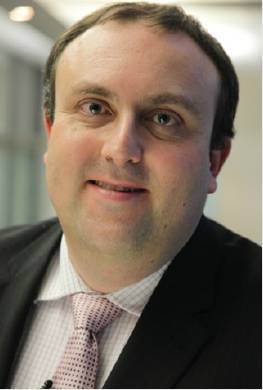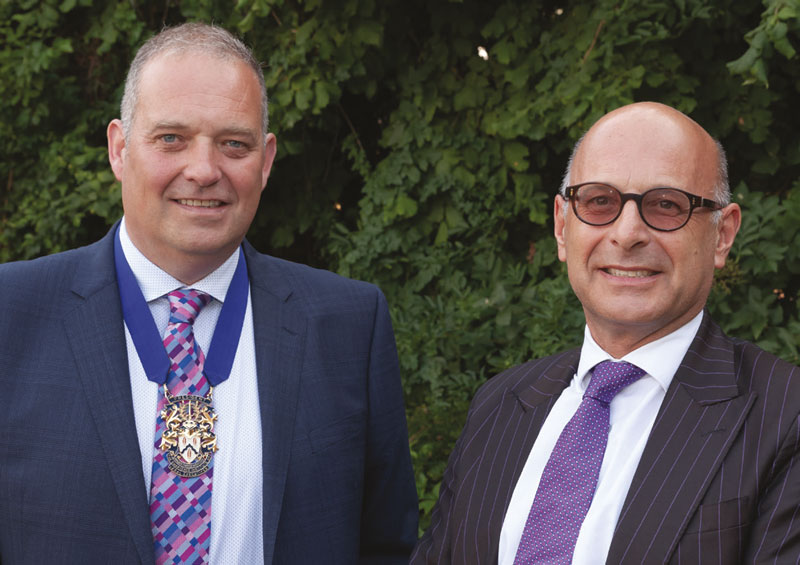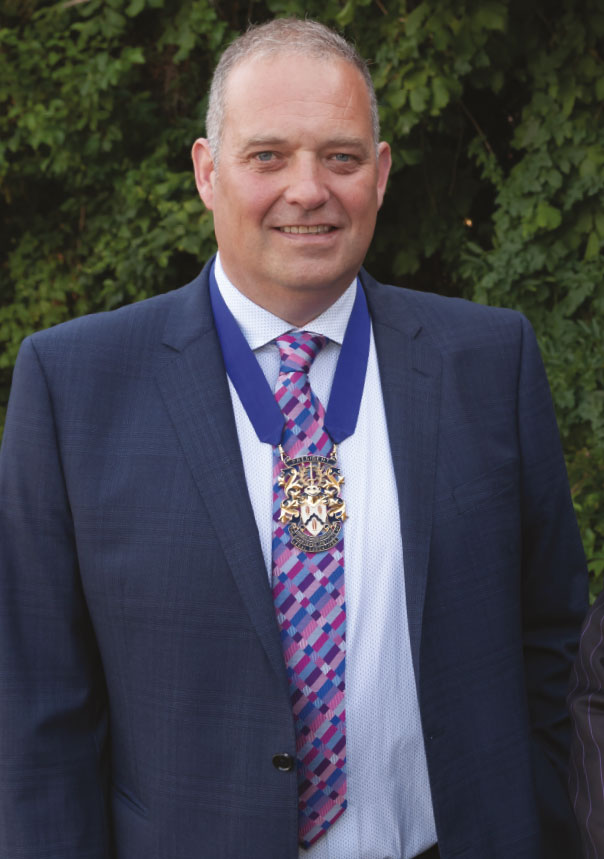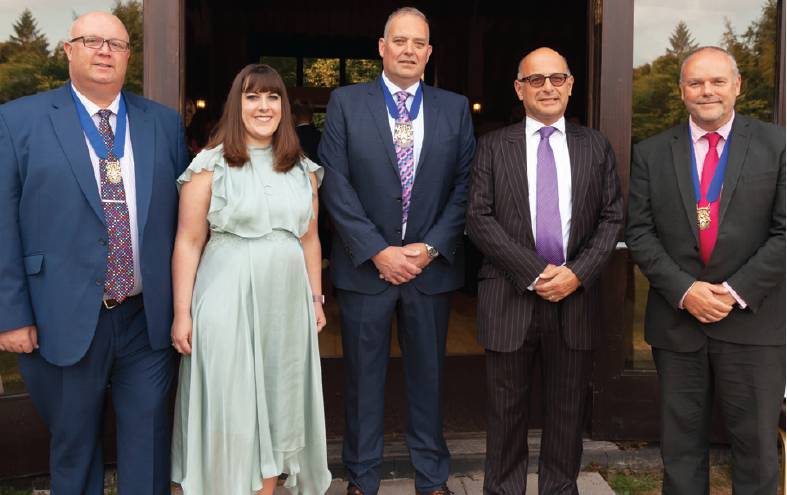CILEx President
Presenting Philip Sherwood: your new CILEx President
The 55th President – and chair of the new CILEx Professional Board – takes the helm at a time of unprecedented changes for the Chartered Institute.

About the author
About the author Neil Rose is the editor at Legal Futures
Few of Philip’s 54 predecessors have taken over as President of CILEx at quite such an auspicious moment.
The day before his inauguration, the Lord Chancellor David Gauke announced that he had accepted the Legal Services Board’s recommendation that CILEx Regulation be allowed to license alternative business structures (ABS).
And then the day itself – aside from the personal achievement of taking custody of the badge of office – marked the start of the Chartered Institute’s new governance reforms. They mean that Philip is the first person to chair the Board of CILEx Professional, one of the three Boards that sits under the new CILEx Group Board, under the chairmanship of Professor Chris Bones.
CILEx Professional is dedicated to promoting the profession’s interests and it is as members’ spokesman – unencumbered by other interests – that Philip will act.
The other Group companies are CILEx Law School and Group Services, providing business infrastructure to all parts of the Group. CILEx Regulation will continue to have its own independent Board.
A notable feature of the CILEx Professional Board is that, with 11 members – two of whom are independent people – it is less than half the size of the old 23-person council.
Philip, unsurprisingly, identifies helping the governance changes bed in as one of the key challenges for his year in office.
'They are intended to make the organisation more efficient and business-like,' he says. 'If you have too many people things can get unwieldy and it becomes difficult to get things done.
He says that the CILEx Council was 'very brave' in making the changes because some Council members have had to give up their roles or move to other places in the governance structure.
Membership of the various boards is now based on selection and appointment against core competences rather than a process of nomination and election.
'We’ve all had to undergo quite a rigorous application process, proving competencies to show we are the right people for the job,' Philip says.
'It’s obviously a shame to lose people who have given good service over the years. But the new structure has got to be fit for purpose – we want the right people in the right places, leading the organisation and making the strategic decisions about our future.'
The latest CILEx consultation endorsed this approach, and the next stage is to assess how this affects, for example, the CILEx branch structure, involving non-Fellows in the governance structure, and ensuring that members receive the right services and support from their Chartered Institute.
 Philip Sherwood with guest speaker: His Honour Judge Marc Dight QC CBE
Philip Sherwood with guest speaker: His Honour Judge Marc Dight QC CBE
This is important because Philip is alive to the danger of spending too much time looking inward: while good governance is important to members, and guarantees the public standing of their qualification, they also want to know what CILEx is doing for them on the ground.
So, another major theme of the next 12 months is reform of the CILEx qualifications and the membership grading structure that sits alongside them. 'We have to ensure that our qualifications are relevant and provide members with the skills employers want,' he explains.
The CILEx route has, of course, always been a much more affordable route into the law than any other, but now the Chartered Institute is facing competition from solicitors’ firms offering apprenticeships.
Philip says: 'The unique selling point we used to have – ‘Earn as you learn’ – is being emulated, which is why we are looking at our whole offering. The outcome will still be the most affordable route into the profession, but we are trying to build something that stays relevant and takes account of the wide range of skills lawyers now need.'
He would like to see Fellows gain practice rights on qualification: 'That’s one thing that holds our members back at the moment. They qualify, gain the title of Chartered Legal Executive, and then have a further process to go through to get rights of audience.
'But enabling our members to qualify with practice rights will involve changing the course delivery and qualification to incorporate all elements needed to get a practising certificate within the basic qualification requirements.'
This will arguably make Chartered Legal Executives more 'practice ready' for their specialist areas than other parts of the profession who, at the start of their post-quali fication careers at least, are much more generalist.

Philip Sherwood was born in Poole, in Dorset, and still lives nearby. His father was a bricklayer and his mother worked part-time in a variety of roles.
He was educated at Poole Grammar School, but left to go to Poole College of Further Education at the age of 16, coming out ‘with a couple of not very good A levels in physics and computer science’. He then got a job at an insurer, which is now LV. This sparked an interest in law, prompting him to study A-level Law at night school over a year. He achieved an A grade.
Philip looked into pursuing a law degree, but by that time he was working and had a family and mortgage. This took him to the CILEx route, and he started studying in the evening at Bournemouth College of Further Education.
Realising that he needed to work in a law firm, Philip moved into private practice, joining a London-based personal injury (PI) practice dealing with high-volume road traffic accident cases involving credit hire and repair.
In 1996, he moved back to Bournemouth to work for the Isaacs Partnership, dealing with mixed caseload of PI and clinical negligence. He qualified in 2000 and went on to head up the PI department, as well as being involved in the management of the firm.
In 2004, Philip moved to Coles Miller, in Bournemouth, where he dealt with a mixed caseload of PI claims and headed up the motorcycle and equine law departments.
In 2011, he started a consultancy specialising in costs. He is also a consultant at Citadel Law, a law firm that specialises in advising other firms on running PI practices.
He has sat on the Civil Justice Council’s costs committee since 2013. He became chair of the CILEx Bournemouth and District Branch in 2013 and joined the CILEx council the same year.
Philip’s wife is a nurse, and they have two daughters and a son. They have also fostered other children for several years.
When time allows, his passion is motorbikes: ‘I’ve always had bikes and I attend many bike events at the weekend.'
Pushing the boundaries has almost been CILEx’s mantra over the last decade in particular, and Philip would like to do more of that when it comes to judicial appointment.
He says that he has no doubt about the ability and expertise of Chartered Legal Executives but is under no illusions that they unreasonably have to contend with 'the weight of history' at the moment, only being able to apply for certain judicial roles.
Merit should be the key criteria: 'We are not looking for special treatment,' he says. 'We are just looking for equality of opportunity.'
Judicial roles should be opened up to allow Chartered Legal Executives to apply. Put simply, if they are good enough, they should be allowed in.
But his concern is that if 'those doors are seen to remain closed', then the most able will not even contemplate applying and the judiciary will be all the poorer for it.
'If the government is serious about diversity, then judicial eligibility criteria should be changed to open those doors to enable representatives from the most diverse arm of the legal profession to be able to apply.
'Not only is this good for the profession and judiciary, it has real public interest benefit. It can only improve public confidence in the judiciary if people see more people who look like them dispensing justice.'
In this way, it is not impossible that, one day, a Chartered Legal Executive will be sitting in the High Court, Court of Appeal or Supreme Court: one of the newest Court of Appeal judges, Sir Gary Hickinbottom, is a solicitor who started his judicial career as a part-time parking adjudicator after all.
More Chartered Legal Executives on the bench will also serve to increase awareness - among both the public and other parts of the legal profession - of what they do.
For all that CILEx now stands shoulder to shoulder with the Law Society and Bar Council in promoting and lobbying on many issues, there is no hiding the fact that status remains a perennial issue.
Philip knows it is a big part of his role to promote understanding of the profession, but says that it has to be balanced with celebrating ‘the CILEx difference’: equal but different is the goal.
He observes that the qualifications review forms part of this, especially as it will also consider the wider environment in which CILEx members find themselves.
More than ever, being a lawyer is not just about the law: understanding the role and potential of technology and the importance of business development and client management skills have the ability to raise the status of members within and without their firms.
Furthermore, 'the more members we get into higher-pro file roles, the more usual the term 'Chartered Legal Executive' will become'.
Part of this is the small - but growing - number of members setting up their own practices, and the ability of CILEx Regulation to license ABS means that those who have, until now, had to go to the Solicitors Regulation Authority for this will not have to do so in future.
Phil’s view is that legal aid should be restored for many types of cases, particularly family work, and crime. People doing the work need to be able to make a living. Aside from the lack of legal aid in many areas, court fees also present an access to justice challenge.
This leads into his particular area of expertise: civil litigation and especially costs. Few, if any, areas of legal practice have faced such a welter of reform in recent years, following the Jackson reforms and Legal Aid, Sentencing and Punishment of Offenders (LASPO) Act 2012, all implemented in 2013, and now with the Civil Liability Bill going through parliament.
In April, one of the last Jackson reforms to be implemented – the electronic bill of costs – came into force for cases in the county court and Senior Courts Costs Office. This represents a major shift in how lawyers record their time and is expected to have a very bumpy start.
'We’re in a transitional period between old-style and newstyle bills,' says Philip. The principle of the new system – that at the end of the case you should be able to press a button and produce a bill – is good, but it’s been over-complicated, and most firms simply can’t do that yet.
'At the moment, you’ve got all the work done prior to April that is still recorded under the old system, so it’s not recorded under phases, tasks and activities. So, you are creating two separate bills under different formats. It’s all a bit of mess, and will take two or three years to settle down.'
 (l-r) Matthew Foster, deputy president; Linda Ford, CEO; Philip Sherwood, President; HHJ Marc Dight QCC CBE; and Craig Tickner, deputy vice-president
(l-r) Matthew Foster, deputy president; Linda Ford, CEO; Philip Sherwood, President; HHJ Marc Dight QCC CBE; and Craig Tickner, deputy vice-president
The Ministry of Justice recently began a review of Part 2 of the LASPO Act – which introduced the costs reforms – and in late June Philip attended a Civil Justice Council seminar that kicked off the process.
'Most claimant firms just want everything to settle down,' he recounted. 'The whole purpose of LASPO was to reduce the cost of litigation, but unfortunately there are no statistics.
'Insurers must hold information on how much they were paying out pre- and post-LASPO, but nobody is volunteering it. The overall consensus seems to be that costs have come down since LASPO, but it’s difficult to gauge.'
He also has reservations about costs-budgeting, that they have not been the success that was planned. He has even heard of some reports that clinical negligence costs have actually increased under -- presumably not least because everybody is paying £1,000 - £1,500 for the costs budget, which has become an extra cost in the case. Some defendants also think that judges are over-generous when budgeting.
Phil is also of the view that proposals to apply fixed compensation levels on whiplash injuries are wrong as they interfere with the law of tort. They effectively suggest that certain genuine injuries are less deserving of compensation than others. It is difficult also to see the link to these reforms and reducing fraud: fraudulent claims should not receive payment in any circumstances but reducing payments in genuine cases only penalises those who have really suffered.
Phil also questions the fairness of increasing the small claims limit from £1,000 to £5,000. Within that limit bracket, will be people with broken arms and legs, which are not minor injuries, particularly for the elderly. He is of the view that an inflationary rise was sensible, taking the limit up to £1,800 or £2,000, because the small claims limit has been the same for about 20 years.
For all the changes in the legal world during his career, Philip remains confident that a legal career remains a positive choice, though it is perhaps less straightforward than it used to be.
The parts that most appealed to him, such as going to court are, in many areas of practice, changing, and new developments are creating a new and different appeal such as the increasing use of technology in legal services.
He is also confident that Chartered Legal Executives, and their Chartered Institute, are uniquely placed to create practice-ready professionals, enabled by their professional body to pursue their personal career aspirations and meet the requirements of their employers, their clients and the changing market.
He says: 'I wouldn’t change a thing. CILEx has given me the opportunity to have a career that I could otherwise not have had. I am not alone among our members to have benefitted like this. I am, therefore, delighted and committed to picking up the baton and doing my part to lead the next stage of our reforms to give yet more support and benefits to our members and those they serve.'